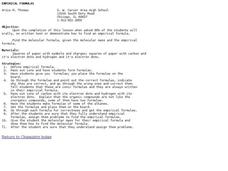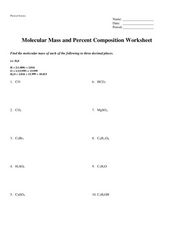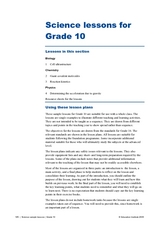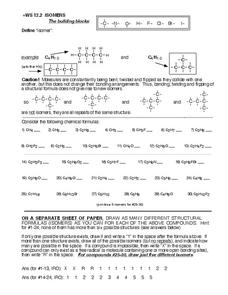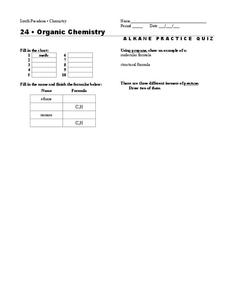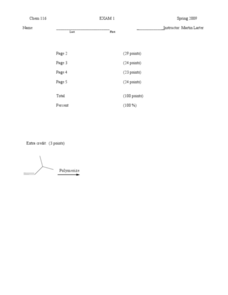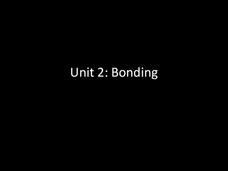Curated OER
Water - the (Nearly) Universal Solvent
For this water worksheet, learners explore the reasons why water is considered a universal solvent. Students compare different ways to change the dissolving rate of a solute. This worksheet has 11 fill in the blank and 8 matching questions.
Curated OER
Polarity Homework
For this polarity worksheet, students are given 5 compounds and they draw the Lewis structure for each, they identify the bond angels, they write the molecular shape and they determine the polarity of the molecules. Honors students...
Curated OER
Empirical Formulas
Young scholars investigate empirical formulas for molecules. In this empirical formulas lesson plan, students use paper ions to form formulas and they show these are empirical formulas. They use ions of carbon and hydrogen showing...
Curated OER
Molecular Mass and Percent Composition Worksheet
In this molecular mass and percent composition learning exercise, students find the molecular mass of 10 compounds to three decimal places. They also find the percent composition of 7 compounds and express their answers to two decimal...
Curated OER
Science Lessons for Grade 10
Tenth graders identify the parts and functions of the cell. In this series of science lessons, 10th graders investigate crystal formation in covalent compounds. They investigate the factors affecting reaction rates.
Royal Society of Chemistry
Naming Esters
Do your chemistry scholars know their esters? Introduce the class to the nomenclature and structural formulas of common esters through thought-provoking games. Individuals or pairs of pupils match the name with the formula before using...
Curated OER
Polymers Lab: Bouncy Ball and Slime
Eighth graders investigate chemical reactions to produce polymers. In this polymers lesson plan, 8th graders experiment with sodium silicate and ethyl alcohol to make a polymer. They also experiment with borax and glue to make a polymer....
Curated OER
Isomers
In this isomers worksheet, students define isomers and then draw the different isomers for the given chemical formulas. This worksheet has 30 problems to solve.
Curated OER
What is Plastic?
Students experiment with plastics. In this what is plastic lesson, students make a simple polymer and discuss recycling. Students identify various types of plastics.
Curated OER
Main Group: Properties and Reactivity
In this main group worksheet, students apply their knowledge of the organization of the periodic table to correctly answer 30 multiple choice questions. Students relate information about the properties of the different groups and their...
Curated OER
What do Chemists See When they Look at Chemicals?
In this naming chemicals worksheet, students indicate the prefixes for naming compounds. They fill in a chart with the chemical names and formulas for alkanes. They draw the structural and molecular formula for propane and they draw and...
Curated OER
Organic Chemistry
In this organic chemistry worksheet, students fill in two charts with prefixes used for alkanes and the names and chemical formulas for different alkanes. They draw structural and chemical formulas for given organic compounds.
Curated OER
Unit 3 Bonding
An organized table charting the different types of chemical bonds arrays this resource. The octet rule, ionization energy, and the naming of compounds are also reviewed. Young chemists answer review questions in multiple choice fashion....
Curated OER
The Nature of Salt
High schoolers record information from the periodic table for sodium and chloride. They determine whether salts are molecular or ionic compounds, along with sodium chloride's molecular weight, and relative weights
National Institute of Open Schooling
Chemical Arithmetics
Substances with the same empirical and molecular formula must be differentiated by their structural formula. Part two in a series of 36 has pupils using chemical formulas to calculate how much of a compound is present in a given...
Curated OER
Chemistry 116 Exam 1, Spring 2009
This five-page exam was designed for a biochemistry and organic chemistry course. It covers the molecular geometry and properties of organic comounds. Test takers identify compounds, functional groups, and isomers. They draw Lewis...
Curated OER
Bonding
All different types of bonding are covered in this PowerPoint, along with details of resulting bond and molecule shapes. The definitions of traditional molecule shapes and characteristics of behavior are very useful to assist in...
Curated OER
Covalent and Ionic Bonding:Electron Dot Structures with Ionic Notation
After drawing the valence electron distribution of 13 basic elements, there are spaces to draw 18 more complicated molecules. For each molecule, there is space for a Dot structure and Lewis structure that best describes the...
It's About Time
How Atoms Interact with Each Other
Connect the dots and assist young chemists as they demonstrate covalent and ionic bonding. Class members use their knowledge of valence electrons to predict compound formulas as they arrange electrons into various bonding structures...
Virginia Department of Education
Finding the Formula and Percent Composition
Do you have mole problems? If so, call Avogadro at 602-2140. The lesson starts with pupils working independently to solve for molar mass of ionic compounds. Then they learn to solve for percent composition and later perform an...
Curated OER
Chemistry of Carbon: Building Blocks of Life
After giving basic details about the properties of Carbon, some of the common functional groups and molecules are featured. There are some details about specific functions and impact on the human body. The diagrams are helpful and could...
Biology Junction
Macromolecules
In chemistry, organic means something contains a carbon base. A helpful presentation starts by defining macromolecules as large organic carbon molecules. Scholars answer questions about each topic on the associated worksheet. It covers...
Curated OER
The Living Environment
In this living environment worksheet, students complete a crossword puzzle given 34 clues about the various species in the environment that produce, consume and decompose. Topics also include photosynthesis, respiration, glucose, organic...
Beyond Benign
Breaking the Tension
The tension builds as learners experiment in your classroom. The 17th installment in a 24-part series has scholars investigate the concept of surface tension. After discovering characteristics of surface tension, they add a compound...
Other popular searches
- Compounds and Molecules
- Compounds and Molecules Labs
- Chemical Compounds Molecules
- Elements Molecules Compounds




